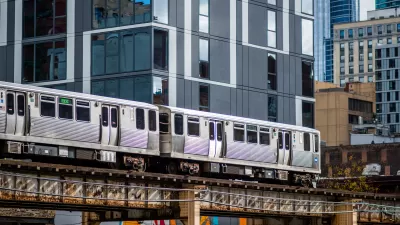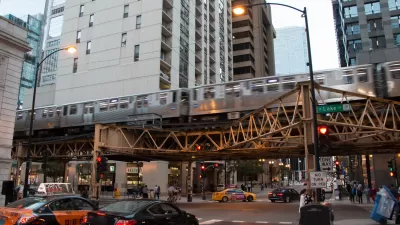A "TOD Calculator" developed by a Chicago non-profit promises to deliver quantifiable, digestible data on the community impacts of transit-oriented development.

The Grow Chicago "TOD Calculator," created by the Metropolitan Planning Council, uses public data to visualize information on a specific address in Chicago—from its zoning code and proximity to transit, to projections of the annual retail revenue, tax income, on-site jobs, and transit ridership a project built there could generate.
Since its release six months ago, developers, residents, aldermen, and small business owners have used the calculator to judge the impact of potential projects on their own communities.
The data has also influenced regulation—helping convince Chicago to expand its 2013 TOD ordinance by increasing the allowed distance from transit, eliminating parking minimums, and adding density bonuses.
Chicago is hardly the first city to look to open data projects for efficiency, transparency, and shared information to help guide policy. But as Sean Thorton, a fellow with Harvard’s Data-Smart City Solutions initiative, points out, data tech alone is not a magical fix for human, urban problems:
It’s true that without open data, the Calculator would not have been possible to build. Yet MPC’s creative work shows that the effectiveness of data portals themselves also has a ceiling. In order for open data to reach its full potential, those who consume it must be willing to take on complex tasks—like MPC and its partners did—to create tools and products that effectively educate and benefit the public.
The Grow Chicago interactive tool has been joined in recent months by other open data portals, such as OpenGrid in Chicago and GeoHub in Los Angeles.
FULL STORY: How Open Data Can Help Encourage More Transit-Oriented Development

Maui's Vacation Rental Debate Turns Ugly
Verbal attacks, misinformation campaigns and fistfights plague a high-stakes debate to convert thousands of vacation rentals into long-term housing.

Planetizen Federal Action Tracker
A weekly monitor of how Trump’s orders and actions are impacting planners and planning in America.

In Urban Planning, AI Prompting Could be the New Design Thinking
Creativity has long been key to great urban design. What if we see AI as our new creative partner?

Cal Fire Chatbot Fails to Answer Basic Questions
An AI chatbot designed to provide information about wildfires can’t answer questions about evacuation orders, among other problems.

What Happens if Trump Kills Section 8?
The Trump admin aims to slash federal rental aid by nearly half and shift distribution to states. Experts warn this could spike homelessness and destabilize communities nationwide.

Sean Duffy Targets Rainbow Crosswalks in Road Safety Efforts
Despite evidence that colorful crosswalks actually improve intersection safety — and the lack of almost any crosswalks at all on the nation’s most dangerous arterial roads — U.S. Transportation Secretary Duffy is calling on states to remove them.
Urban Design for Planners 1: Software Tools
This six-course series explores essential urban design concepts using open source software and equips planners with the tools they need to participate fully in the urban design process.
Planning for Universal Design
Learn the tools for implementing Universal Design in planning regulations.
Appalachian Highlands Housing Partners
Gallatin County Department of Planning & Community Development
Heyer Gruel & Associates PA
Mpact (founded as Rail~Volution)
City of Camden Redevelopment Agency
City of Astoria
City of Portland
City of Laramie





























